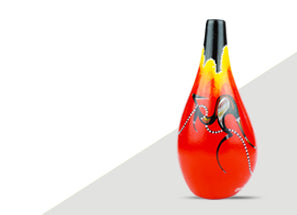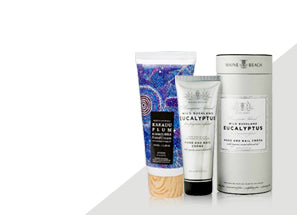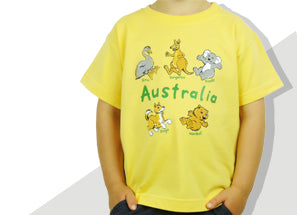-
Aboriginal
- Artwork
- Bags
- Bath and Body
- Boomerangs
- Coasters & Placemats
- Cufflinks
- Cushions
- Jewellery
- Scarves
- Socks
- Souvenirs
- Stationery
- Tablecloths & Runners
- Teatowels
- Ties
- Wrapping Paper

-
Artists

-
Bath and Body

-
Clothing
- Adult Tshirts
- Adult Ladies Tshirts
- Bibs
- Childrens Tshirts
- Gloves
- Hats
- Leather Wallets
- Scarves
- Socks/Footwear
- Ties
- Winter Scarves

-
Homewares
- Aboriginal
- Aprons
- Bags
- Ceramics
- Christmas Decorations
- Clocks
- Coasters
- Cushions
- Foods
- Glass
- Picture Frames
- Placemats
- Tablecloths & Runners
- Teatowels
- Timber Trivets
- Window Decals
- Wine Charms

-
Jewellery

-
Souvenirs
- Books
- Can Coolers
- Childrens
- Chocolates
- Gold Pins
- Jerky
- Keyrings
- Leather
- Magnets
- Mouse Pads
- Pewter
- Skins
- Soft Toys
- Two Up
- Wind Spinner

-
Stationery

-
Timber
- Banksia
- Bookmarks
- Christmas Decorations
- Clocks
- Coasters
- Frames
- Pens & Accessories
- Puzzles & Toys
- Trivets

Australian Made criteria
At Australian Choice we love to support businesses producing quality products that are Made in Australia - but what does that really mean?
For a product to be 'Made in Australia' there are some key criteria that must be met.
The main criteria is that the product must have undergone substantial transformation within Australia.
What does substantial transformation mean?
The Australian Consumer Law effectively states that a good has been substantially transformed in a particular country if the good:
a. was grown in a particular country (where each ingredient or significant component of the good was grown in that country; and all, or virtually all,
processes involved in the production or manufacture of the good happened in that country); or
b. is the produce or product of a particular country (where the country was the country of origin of each significant ingredient or significant component of the
good; and all, or virtually all, processes involved in the production or manufacture of the good happened in that country); or
c. as a result of one or more processes undertaken in that country, is fundamentally different in identity, nature or essential character from all of its
ingredients or components that were imported into that country.
The Australian Competition and Consumer Commission (ACCC) has expressed the view that simple processes, such as reconstituting imported juice concentrate into fruit juice, may not constitute a substantial transformation.
Similarly, the mere assembly of imported components into household or other items may not be considered to be a substantial transformation.
You can find out more by reading the full detail in the Australian Made Code of Practice Document.
Only products that meet this criteria are allowed to display the Australian Made logo:

The criteria is set by the Australian Made Campaign Limited, which is a government funded body set up to administer the Australian made logo.
You can visit their website here: Australian Made Campaign Limited
The Australian Competition & Consumer Commission (ACCC) also plays an important part in protecting country of origin claims.
Country of origin claims
A country of origin claim is any labeling, packaging, logo or advertising that makes a statement, claim or implication about the country from which goods come.
The most common claims are 'Made in Australia', or 'Product of Australia'.
The law
The Trade Practices Act prohibits businesses from making false or misleading representation concerning the place of origin of goods. The Act defines a set of defences for goods that pass certain tests. These are set out below.
Substantial transformation
The provisions define substantial transformations as:
A fundamental change - in form, appearance or nature such that the goods existing after the change are new and different goods from those existing before the change.
What does that mean?
It means that simple treatments or processing - such as repackaging or mere assembly - are not likely to qualify an otherwise imported good for the 'Made in Australia' claim.
An item must be "substantially transformed" in Australia.
Costs of production
Under the Act, three broad categories of costs of production or manufacture are considered:
- expenditure on materials
- labour, and
- overheads.
The costs must relate directly to the final goods.
'Product of Australia'
This is now regarded as a premium claim about the origin of goods, and two rigorous criteria must be met:
- each significant component (or ingredient) of the good must originate from the country of the claim; and
- all, or virtually all, of the production processes must take place there.
Complaints and inquiries
Complaints and enquiries should be taken up with the retailer who sold the goods or with the manufacturer. They might not realise that their claims risk breaching the law.
Otherwise you can contact the ACCC at its offices in each capital city as well as Townsville and Tamworth.
More information
The ACCC's guide to Country of origin claims and the Trade Practices Act is available free from all ACCC offices or on its website www.accc.gov.au









